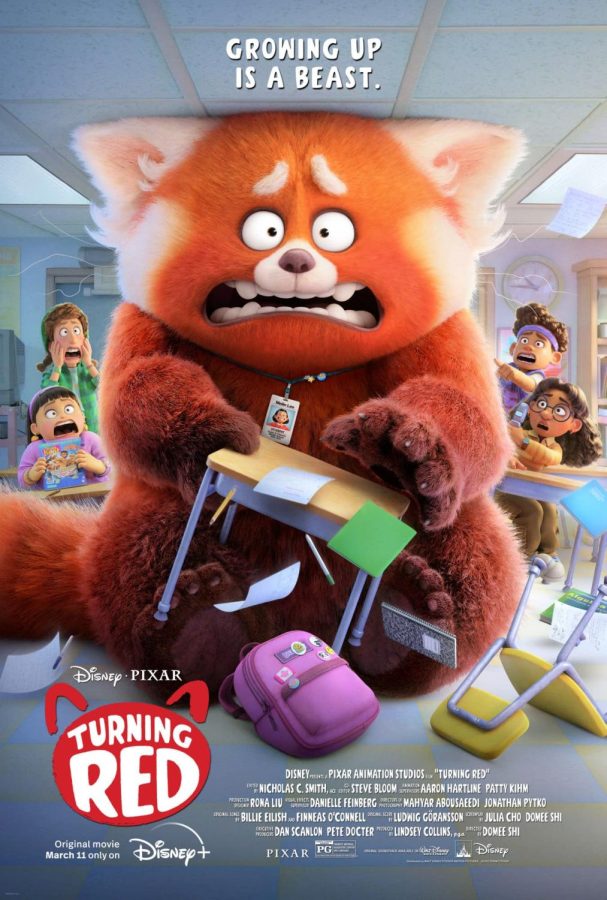“Turning Red:” A Beautiful Exploration of Adolescence
“Turning Red” provides a touching and comedic look into the life of an adolescent girl dealing with the pull between parental pressure and teenage misadventures.
June 19, 2023
“Turning Red” is a movie about a daughter freeing herself from the restraints of her family, especially her mother. It reminds me of another movie about an immigrant family whose second-generation daughter is liberating herself from the repressive ideology that seems built into her mother, as in “Everything, Everywhere, All at Once.” And, as in that movie, “Turning Red” effectively tackles this theme, presenting it poetically, in such a way that anybody understands the struggle of being under the thumb of an authoritarian parent.
Mei or, as her mother dotingly calls her, Mei Mei is a 13-year-old girl living in the suburbs of Toronto with her mom and dad. Her dad’s a soft-spoken sweetheart, while her mother’s a dictate who wants only perfection from her daughter.
The story takes place in the early ’00s, and Mei and her friends are the self-described “biggest fans’ ‘ of the boyband 4-Town (funnily, there are five members). One morning, Mei wakes up to see a gigantic, red panda in the mirror, which she finds out is a power that’s passed down in her mother’s lineage. After struggling to adapt to her new form, Mei learns to control it, and uses it in a scheme her and her friends come up with to buy tickets to the 4-Town concert in Toronto.
Mei’s struggle to not only adapt to, but also to understand and accept her red panda counterpart is an eloquent metaphor for the conflict we all undergo when we reach a certain age where our parents’ opinions of ourselves matter less, and those of our friends become that much more important. Above all, we hope for our friends to support and encourage us to be who we are.
In one scene, we see Miriam, Mei’s best friend, telling Mei she doesn’t need to go through with a ritual that will help her repress the red panda, and instead she could accept it as a part of who she is.
In another touching scene, we see Mei’s father discover a video she and her friends recorded while goofing around when she was in red panda-form. Upon seeing this, he goes to her and tells her that he accepts and loves her for who she is.
“This side of you,” he snickers, “Made me laugh.”
The animation is vibrant and playful. Her friend Abby’s expressions are especially dramatic in how a furrowed brow and wide eyes quickly turn to a curious, wide gaze. These expressions differentiate Abby from Mei’s other friends, Miriam and Priya, the latter of whom has little to no intonation, and whose eyes are always half-closed. There were subtler expressions in scenes with Mei and her mother, Ming, whose mannerisms and changes of face were brought up by the voice acting of Rosalie Chiang and Sandra Oh, respectively.
As an example, Mei apologizes to her friends for turning her back on them when it mattered, that is, when Mei was deciding between their support and her mother’s approval when her mother blamed her friends for her hurting one of her peers as the red panda. In that scene, you can hear exasperation in Mei’s voice from what she’s been going through, as well as the hard time of apologizing for what she knew even in the moment was going to hurt her friends. Miriam, voiced by Ava Morse, offered the most emotional versatility among the friends, who in the same scene admits to even “singing lullabies” to Mei’s tamagotchi (another cute and laughable sign of the times).
The other friends, Abby and Priya, did feel one-note and offered little to the progression of the story overall. They may have been written this way, just to have a playful and fun part in the story, but their characters felt unnecessary.
Thematically, “Turning Red” was complicated, and I loved it. There’s a brilliant interplay between the way Mei and her mother, Ming was raised, the latter being suggested at only near the end by her mother’s dread at the idea of her grandmother’s arrival, and the way Mei’s mother and her aunts treat her grandmother like their drill sergeant. In the process, Mei’s mother becomes less of a villain, as we knew was never true, and becomes more of a victim, portraying a cycle of abuse that’s all too common for families with such high-strung parenting styles.
Furthermore, the various intrapersonal and interpersonal conflicts in the movie, such as Mei’s difficulty deciding between following her mother’s orders and accepting the freedom that comes with being around her friends, are what make this a great movie. In one scene Mei is reprimanded by her mom after lashing out at a classmate at a flashy, red panda-themed party he hosted at his parents’ mansion. This puts her between her mom laying the blame on her friends for her behavior, and her friends who understand her and know why she lashed out in the first place. It’s the decision to follow her mother in that situation instead of her friends that has a clear point in the plot and its influence on Mei’s development.
I can’t stress enough the beauty in this movie’s thematic and character progression, as well as its visual flair that makes for a surprisingly memorable, adorable, and tear-jerking watch. If you’d like to watch it, it’s available on Disney+.




















